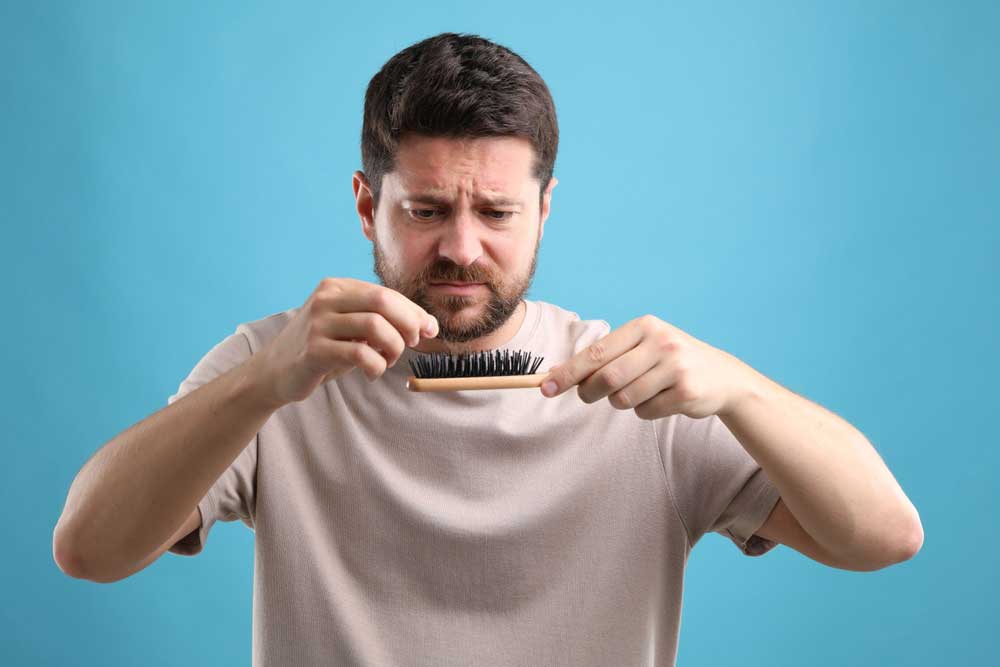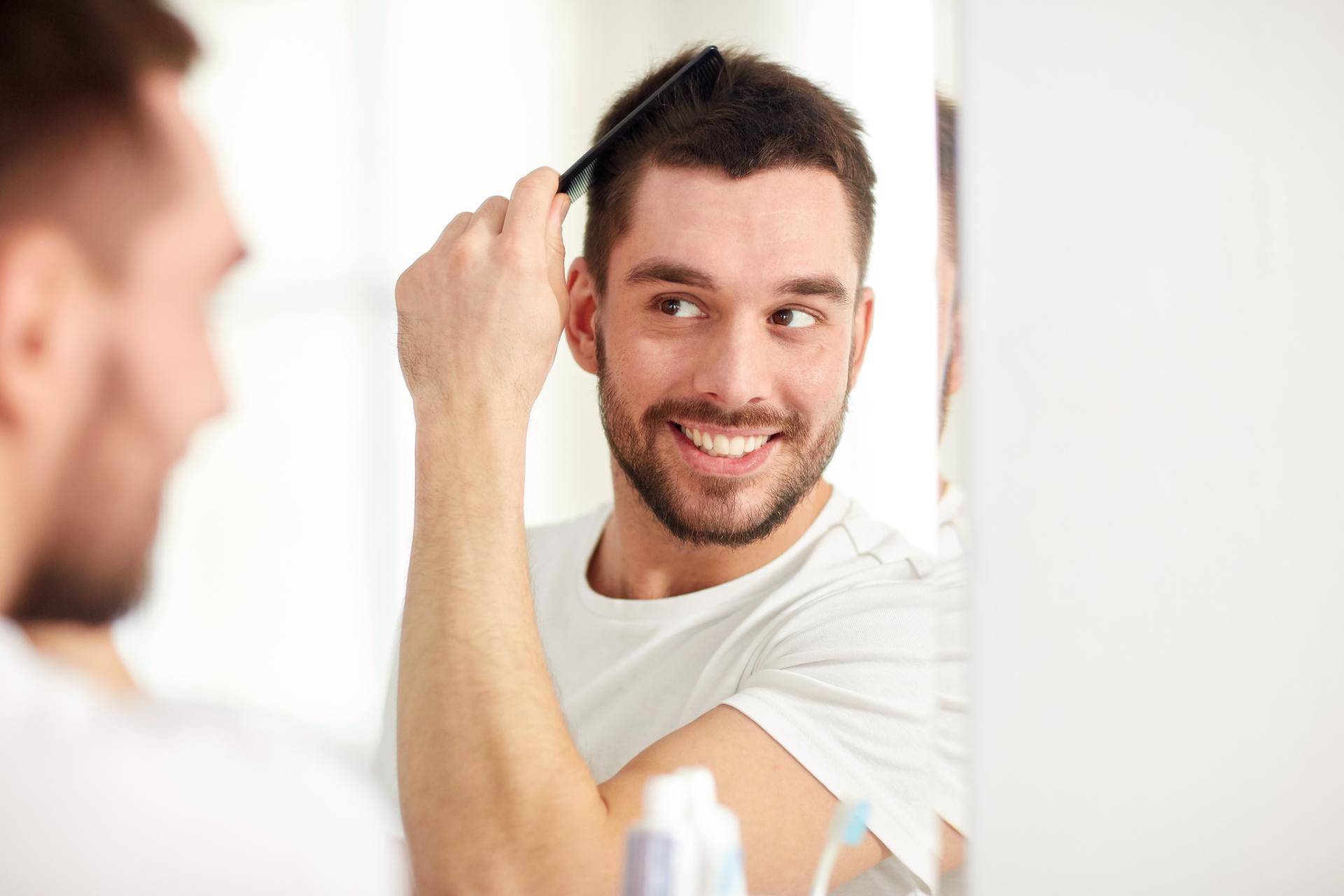Disclaimer: The material on this website is provided for informational purposes only and should not be used in place of medical advice. Always consult your physician before beginning any therapy program or treatment plan.
Whether you want to mitigate hair loss or simply want healthier hair, there are many natural ways you can achieve this. Many of these you may already have as part of your daily routine. Yet, there’s bound to be something new you’ll learn. The following are the 5 Best Vitamins for Hair Growth. If you enjoy this article, be sure to share it!
Vitamin A
Hair is the fastest growing tissue in the human body. Like all other cells, hair needs Vitamin A to grow healthy. This vitamin is the generic term given to a group of fat-soluble compounds highly important for human health.
Vitamin A compounds are found in both animal and plant foods and come in two different forms: Preformed Vitamin A and Provitamin Vitamin A. The first form, Preformed vitamin A, is known as the active form of the vitamin. This is the version your body can use just as it is.
In terms of hair, diets deficient in vitamin A may lead to several problems, one of which includes hair loss. However, too much of the vitamin can of course be counterproductive. It is best to consult your personal physician if you are unsure on what is the proper dosage you should take.
You can easily get your daily dose of Vitamin A through a well-balanced multivitamin or even through dietary supplements like Cod Liver Oil which are also available in pill form. Though taking Vitamin A in pill form is an option and a popular one, the supplement might not offer the same benefits as naturally occurring antioxidants in food.
Just a few Vitamin A-rich foods you can easily add to your diet include: Pumpkin, Kale, Carrots, Sweet Potatoes, Spinach, Mangoes, Eggs, & Milk.
Other great benefits to Vitamin A include:
-Protecting eyesight against age-related issues and night blindness
-May reduce chances of getting certain cancers
-Important in maintaining a healthy immune system
-Reduces the risk of acne
-May help with health of bones
-Promotes healthy growth and reproduction
Odds are you’re already eating these foods on the daily so keep it up!
B-Vitamin
B Vitamins, a class of water-soluble vitamins that play important roles in cell metabolism, are known collectively as B Complex Vitamins since there are eight different types: thiamine (B1), riboflavin (B2), niacin (B3), pantothenic acid (B5), pyridoxine (B6), biotin (B7), folate (B9) and cobalamin (B12)
In general, B-vitamins help carry oxygen and nutrients to your scalp, which aids in hair growth. Specifically, these vitamins help create red blood cells, which carry oxygen and nutrients to the scalp and hair follicles.
Though there are multiple types of the vitamin, the one we will focus on is Biotin.
Biotin (also known as vitamin H, vitamin B₇ or vitamin B₈) is one of the most important vitamins in terms of hair growth. Recommended intake for B vitamins varies depending on age, nutrient demands, gender and health status. It is best to consult your personal physician if you are unsure on what is the proper dosage you should take.
To have not just a Biotin-rich, but a well-rounded B Vitamin-rich diet, be sure to include foods such as: Salmon, Leafy Greens, Avocados, Liver (and other organ meats), Eggs, Milk, Beef, Oysters/Clams/Mussels, Sweet Potatoes, Broccoli, Chicken/Turkey, Yogurt, Nutritional and Brewer’s Yeast, Pork, Fortified Cereal, Trout, Sunflower Seeds,
More benefits of B Vitamins include:
-May lower stress levels
-Shown to promote cognitive performance
-May reduce anxiety and depression
We at Hair By Dr. Max, Restoration Center offer a great source of Biotin:
The Follicle Elixir IV Therapy Treatment
If this interests you, please feel free to contact us if you’d like to learn more.
Vitamin C
Vitamin C, also known as ascorbic acid, is necessary for the growth, development and the repair of all body tissues. This plays a role in the health of hair since it is the largest tissue of the human body (As we learned from reading about Vitamin A). This vitamin is a strong antioxidant that helps fight against oxidative stress caused by free radicals. Free radical damage can cause a blockage in growth, thus causing your hair to age. Moreover, graying is also affected by free radicals. Being an antioxidant, Collagen may be able to fight this damage and slow graying.
An important aspect to Vitamin C is the protein, Collagen. Hair is primarily composed of the protein Keratin, which is found in Collagen. When consumed along with other proteins and broken down into amino acids by the body, Collagen can help promote the building of new proteins and compounds. Collagen is primarily made up of 3 nonessential amino acids: proline, glycine, and hydroxyproline. roline is also the main component of keratin. Therefore, consuming proline-rich collagen should provide your body with the building blocks it needs to create hair.
For adults, the recommended daily amount for vitamin C is 65 to 90 milligrams (mg) a day, and the upper limit is 2,000 mg a day. Although too much dietary vitamin C is unlikely to be harmful, megadoses of vitamin C supplements might cause negative side effects such as Diarrhea. Nausea. If it easier, just a few a foods that are rich in Vitamin C include: Strawberries, Peppers, Cantaloupe, Cauliflower, Kale, Kiwi, Brussels sprouts, Guavas, and Citrus fruits
An easy way to make your diet rich in Collagen is by including bone broth as a drink or soup. Additionally, Collagen is also available in pill/powder. Since it is odorless and tasteless, it can be added to your favorite beverages, like smoothies or even coffee, without impacting taste.
Other Benefits of Vitamin C and Collagen include:
–May reduce your risk of chronic disease
-May help manage high blood pressure
-May lower your risk of heart disease
-Boosts immunity
-Helps prevent iron deficiency
-May reduce blood uric acid levels and help prevent gout attacks
-Can improve skin health
-Helps relieve joint pain
-Can help boost muscle mass
Vitamin D
Vitamin D is a group of fat-soluble secosteroids responsible for increasing intestinal absorption of calcium, magnesium, and phosphate, and multiple other biological effects. Studies have shown a direct correlation between Alopecia (a technical term for hair loss) and low levels of Vitamin D. Additionally, research also shows that vitamin D may help create new follicles – the tiny pores in the scalp where new hair can grow.
Our body produces Vitamin D simply through direct contact with the sun’s rays. Aside from this, good dietary means of getting Vitamin D include Fatty fish (like tuna, mackerel, and salmon), Calcium-Fortified foods (Diary, Soymilk, Orange juice, cereals), Egg Yolk, Beef liver, Spinach, Cheese, White beans, and Collards.
More benefits of Vitamin D include:
-Lower levels of anxiety and depression
-Maintaining healthy bone density
-Promotes muscle mass growth
-Lower levels of fatigue
-May relief chronic pain
-May promote fertility
-May increase overall endurance
When you get the recommended daily amount of vitamin D, you’re able to maintain hair growth, bone health, and normal calcium breakdown. If you are concerned you could be Vitamin D deficient, you should consult your doctor who will likely suggest supplements, dietary changes, and spending more time outdoors to help combat the deficiency.
Vitamin E
Vitamin E is the collective name for a group of fat-soluble compounds with distinctive antioxidant activities. The term “Vitamin E” describes eight different compounds. Alpha-tocopherol is the most active one in humans. Similar to Vitamin C, Vitamin E also plays a role in lowering oxidative stress, thus directly impacting the hair health.
In one study, people with hair loss experienced a 34.5% increase in hair growth after supplementing with vitamin E for 8 months, while the placebo group only benefited by 0.1%.
Dosages shouldn’t exceed 1,000 international units (IUs) per day if you’re using synthetic supplements. The recommended daily allowance (RDA) for ages 14 and up is 15 milligrams (mg). It is best to consult your personal physician if you are unsure on what is the proper dosage you should take.
Including vitamin E in your diet is very simple. Foods that are rich in this vitamin include: Vegetable oils, Nuts, Seeds, Green leafy vegetables, Mangoes, Spinach, Avocados, Squash, Kiwifruit, Trout, Shrimp, Olive oil, Wheat germ oil, and Broccoli
More benefits of Vitamin E include:
-Lower blood pressure
-Aids in lengthening cell lifespan
-May help repair damaged cells
-Lowers chance of heart disease
-Lowers chance of cancer
Takeaway:
There are countless natural ways you yourself can mitigate hair loss. As you’ve read, a lot of these vitamin-rich foods have multiple beneficial properties to them. Thus, making a diet that is not only healthy but also contributes to healthy hair growth is not very difficult. At the end of the day, it is up to you to determine if supplemental vitamin pills/powders are also necessary. However, checking with your doctor is definitely suggested before doing so, as you may be getting enough from your diet. If you have any questions regarding hair loss solutions or any of our other services, feel free to contact us!


